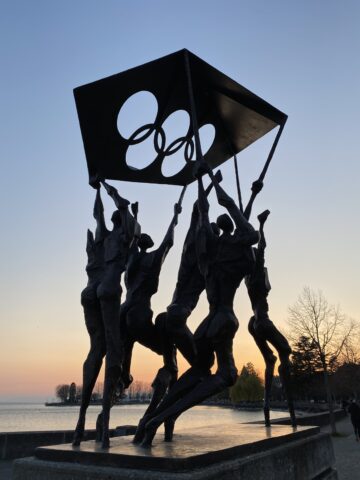Swiss Federal Supreme Court judgments in sports-related cases from 2023
A summary of selected Swiss Federal Tribunal judgments in motions to set aside CAS awards published in 2023
In 2023, the Swiss Federal Supreme Court (SFT) issued several noteworthy judgments in motions against awards rendered by the Court of Arbitration for Sport (CAS). In most of them, it reiterated the high admissibility threshold. Accordingly, pleas of appellatory nature are generally inadmissible, but also the parties have an obligation to raise any procedural irregularities / violations of the right to be heard in an explicit and unequivocal manner as soon as they arise.
Furthermore, the SFT re-confirmed its very strict view of violation of public policy. There is, in principle, no violation of public policy in case of the late uploading of a statement of appeal on the e-filing platform, the lack of online hearing of (protected) witnesses, several extensions of the time limit to issue the arbitral award, the non-transmission of the full decision to a complainant in sports disciplinary proceedings, or in case of disciplinary sanctions imposed parallelly at the national – and the international level. The SFT also reiterated its view that violations of the European Convention of Human Rights (the Convention) cannot be directly invoked but only through the limited scope of public policy and the Swiss Constitution; it will be interesting to see how this view will evolve after the ECHR landmark judgment in Caster Semenya (this case is still pending before the ECHR Grand Chamber).
In terms of jurisdiction, the SFT held that CAS jurisdiction could not go beyond the jurisdiction of the previous instance, that the FIFA tribunal (like the CAS Anti-Doping Division) is not a “true arbitral tribunal” and as such is not bound by the pertinent provisions of the Swiss Code on Civil Procedure and that the FIFA Player Status Committee (PSC) ruling on atransfer agreement is not bound to decide on (the unrelated) set-off against a tort claim.
With respect to the irregular constitution of the arbitral tribunal, the SFT reiterated that there is no analogy between barristers belonging to the same Chambers (who are all independent and thus not partners) and Swiss lawyers belonging to the same law firm. Therefore, in the absence of additional criteria, such connection cannot on its own establish bias or lack of independence of arbitrators. Inversely, the SFT reinforced its view on the parties’ and the parties’ counsel duty of curiosity, which is clearly violated when they fail to examine notorious facts related to the appointed arbitrators in a timely manner; at the same time, the appointed arbitrators are not obliged to disclose publicly available -and easily discoverable- information.

Determination of the nature of the CAS Anti-Doping Division proceedings by the SFT
The judgment 4A_232/2022 of 22 December 2022 examined for the first time the nature of the CAS Anti-Doping Tribunal (ADD) proceedings when the latter acts as a first instance body. A first challenge was dismissed back in 2021 (see my note on 4A_612/2020). A former biathlete’s doping-related case was heard by the CAS ADD acting as the first-instance tribunal, and then by the CAS Appeals Division. In a nutshell, the SFT found that the CAS ADD merely acted through delegation of the disciplinary power over anti-doping matters by an international federation and therefore did not qualify as a “true” arbitral tribunal (see my note on 4A_346/2021). The SFT therefore dismissed the jurisdictional grievance as inadmissible but would have in any case been unfounded based on the de novo review by an independent arbitral tribunal which is the CAS Appeals Division. The SFT also held that the coexistence of two instances within the same tribunal is not unusual (cf. the International Criminal Court, the ECtHR etc.). Overall, the SFT largely accepted the legitimacy of the CAS ADD, to the extent that such instance replaces the internal disciplinary instance of sports federations and is sufficiently independent from the CAS Appeals Division.
FIFA PSC Jurisdiction to hear Set-off Claims for Damages Against Contractual Claims in Football Transfer Disputes
In March 2023, the SFT issued a very interesting 4A_420/2022 of 30 March 2023 related to the Emiliano Sala transfer fee owed by Cardiff to FC Nantes following his tragic plane crash shortly after the transfer. The judgment essentially relates to the scope of the arbitration clause between the parties to a transfer agreement but also the scope of disputes decided by the FIFA dispute resolution bodies and, subsequently, by the CAS. In essence, the SFT confirmed that CAS jurisdiction could not go beyond the jurisdiction of the FIFA PSC and that there were no reasons to justify the concurrent ruling on claims based on the transfer agreement and on (the unrelated) set-off against a tort claim. The SFT equally interpreted the pertinent parts of the FIFA Regulations and confirmed the limited material scope of the FIFA PSC jurisdiction, which does not extend to ruling on civil disputes of football stakeholders that are unrelated to football. This was a thorough judgment that highlights the specificities of sports arbitration with respect to the jurisdictional scope of the FIFA decision-making bodies, which draw the limits of the subsequent jurisdiction of the CAS.
Ne bis in idem in disciplinary proceedings initiated at both the national- and the international level
In April 2024, the SFT issued two factually very similar judgments related to match-fixing in tennis. Both judgments 4A_484/2022 and 4A_486/2022 of 26 April 2023 primarily dealt with the principle of ne bis in idem as part of public policywhen disciplinary proceedings are opened for allegations of match-fixing by both the national federation (NF) and the international federation (IF). In a case where the athlete was acquitted by the NF but convicted by the IF, the SFT held that there was no violation of the principle ne bis in idem and that the material and temporal link between both proceedings constitute “two sides of a unique system”, which would be jeopardized if not triggered in parallel. Consequently, concurrent or subsequent national and international disciplinary proceedings do not infringe Swiss public policy / ne bis in idem, at least as long as national proceedings do not have an automatic international effect.
In addition to the aforementioned plea of ne bis in idem, the decision 4A_484/2022 of 26 April 2023 dealt with the independence and impartiality of an arbitrator belonging to a barristers’ Chamber: The panel chair Mr. Michael J. Beloff KC was challenged by the athlete as two out of the four Anti-Corruption Commissioners worked in the same Chambers. The SFT disregarded the argument that such arbitrator would be inclined to “defend” the decision rendered by his colleagues in order to protect their reputation. After seriously questioning the admissibility of the grievance to the extent that the player had not raised any objection during the hearing, the SFT dismissed the plea as unfounded, confirming that there is no analogy between barristers belonging to the same Chambers and lawyers belonging to the same law firm. Therefore, in the absence of additional criteria, such connection cannot on its own establish bias under Art. 190 (2) a PILA.
Impact of several extensions to issue the CAS award in a match-fixing case on the arbitration agreement and the principle of celerity
In 4A_22/2023 of 16 May 2023, the SFT addressed the questions of numerous extensions to issue the CAS award in a complex match-fixing case related to tennis and its impact on the validity of the arbitration agreement / the celerity of the proceedings. A professional tennis player suspended for eight years for violations appealed his sanction to the CAS in December 2020; a hearing was held one year later and the CAS issued its award in November 2022, after eight extensions of the time limit under the CAS Code. In the subsequent challenge proceedings, the SFT held that the player could not rely on procedural rules that entered into force after his filing of the appeal and that the arbitrators were authorized to render the award as long as their mandate had not been revoked. The SFT equally held that there was no violation of the principle of procedural celerity, finding the procedural length reasonable in view of the complexity of a case related to match-fixing.
Right of a complainant to obtain the full decision in sports disciplinary proceedings
In 4A_184/2023 of 5 June 2023, the SFT addressed the right of a complainant to obtain the full decision in sports disciplinary proceedings. In 2020, a French female semi-professional cyclist had filed a complaint against her team’s manager for sexual harassment before the UCI Ethics Commission. Her request to participate in the proceedings was denied, according to the applicable rules at the time, and she only received a three-page summary of the final decision. In her subsequent motion to the SFT, the latter considered that there was no violation of imperative Swiss law and no violation of public policy because the summary of the decision was sufficient to inform the cyclist on the outcome of the procedure. Similarly, the SFT found that the non-transmission of a disciplinary decision rendered by an association’s organs to the person that filed a complaint does not violate human dignity.
This was a rather unsurprising judgment of the SFT which confirmed its strict approach regarding the limited review of procedural rules of sports federations but also the inadmissibility of arguments of appellatory nature in the federal proceedings.
Non-timely filing of a statement of appeal due to non-established technical problems and excessive formalism
Non-timely filing of the statement of appeal due to non-established technical problems and excessive formalism
In 4A_254/2023 of 12 June 2023, a doping-related sanction was issued by the disciplinary body of the International Fencing Federation (FIE) on 31 January 2023. The athlete’s counsel filed the statement of appeal within the 21-day time limit by email only, requesting at the same time the “Case Registration Form” in order to upload the statement via the CAS e-filing platform. On the last day of the time limit, the counsel uploaded the submission on the e-filing platform, noticing that the platform was particularly slow but without receiving an error notification from the system. Several days later, the CAS informed the athlete that the statement of appeal was filed late. In the subsequent challenge proceedings, the SFT confirmed that the parties uploading their statement of appeal on the e-filing platform bear the burden to establish the valid filing of their submissions, whereas the inadmissibility for non-timely filing cannot amount to excessive formalism (cf also my note on 4A_692/2016).
Publicly available information and duty of curiosity of the parties in a CAS procedure

Publicly available information and duty of curiosity of the parties in a CAS procedure
In June 2023 the SFT rendered several judgments, starting with the unusual 4A_100/2023 of 22 June 2023, which annulled a CAS award, for the first time due to the erroneous challenge of an arbitrator by the ICAS Challenge Commission. In a contractual dispute between an Austrian coach and a Croatian club, a Croatian Arbitrator appointed by the Club signed his declaration without mentioning that he was also an arbitrator at the Croatian Football Tribunal, only disclosing this during the deliberations. Following such disclosure, FIFA challenged his appointment and the ICAS replaced the arbitrator. In this case, the SFT narrowed down the arbitrators’ ongoing duty of disclosure as it does not apply to notorious facts that can be easily discovered (see also my note on 4A_520/2021). Inversely, it highlighted the importance of the parties’ duty to investigate as the starting point for the admissibility of the challenge.
SFT Judgment in the motion to set aside the CAS award in the Yves-Jean Bart judgment
The judgment 4A_170/2023 of 23 June 2023 put an end to the disciplinary proceedings initiated by FIFA against the Haitian Football Federation President Yves-Jean Bart (Respondent) for allegations of sexual abuse vis-à-vis several female players of the national technical center. Following a decision by the FIFA Ethics Committee sanctioning him for several violations of the FIFA Code of Ethics, the CAS annulled the FIFA decision holding that there was insufficient evidence and a lack of coherence or credibility in the witness testimony by the alleged victims during the hearing. In a rather unusual procedural move, FIFA filed a motion to set aside the CAS award in March 2023, invoking a violation of its right to be heard by the CAS panel for refusing to hear one of the victims online by means of a voice distortion mechanism. Interestingly, the SFT considered that FIFA had not validly and explicitly raised an objection to the modalities of the hearing. In any event, such plea was unfounded to the extent that the panel simply suggested an alternative hearing mode of such witnesses. The SFT also held that there is (currently) no statutory obligation to hear witnesses through video conference. In any event, the efficient protection of the identity of witnesses in similar cases remains a very sensitive issue that could be crucial for the outcome of the proceedings. In this respect, it must be noted that the CAS has just published its “Guidelines for the hearing of vulnerable witnesses and testifying parties in CAS Procedures (December 2023)”.
No violation of res judicata in case of an action filed before the national courts and a subsequent FIFA disciplinary procedure.
The judgment 4A_256/2023 related to the FIFA World Cup 2022 and a disciplinary sanction imposed by the CAS on the Equatorian Football Federation (the Federation) for violation of the FIFA Disciplinary Code regarding forgery and falsification of documents of one of its football players. In the subsequent motion to the SFT, the FEF first invoked a violation of ultra petita which was immediately dismissed by the SFT, holding that the parties’ requests for relief included the Federation’s exclusion from the 2026 edition of the World Cup. The SFT also clarified that the parties’ legal interest falls obviously outside the scope of the plea of ultra / infra petita of Art. 190 (2) c PILA.
In a very interesting part of the judgment, the SFT dealt with the Federation’s grievance of violation of procedural public policy (res judicata). The Federation supported that the question of nationality of one of its players had already been examined and decided by the Ecuadorian courts. However, the SFT confirmed that FIFA had enacted its own regulations regarding falsification of documents and could exercise its disciplinary power over its members irrespective of any national rules combatting falsified identity documents. In other words, the two bodies of rules are considered to be autonomous and can coexist. The SFT concluded that there was no identity of the parties and that the subject matter of the proceedings brought before the Ecuadorian judicial authorities and the FIFA disciplinary proceedings was different.
Overall, the judgment seems to confirm previous SFT case law and the restrictive approach regarding res judicata, which is not violated in parallel proceedings enacted upon different sets of rules (e.g. national statutory rules vs. international disciplinary regulations).
Note: a comprehensive compilation of the 2023 SFT judgments has been published on LawInSport





